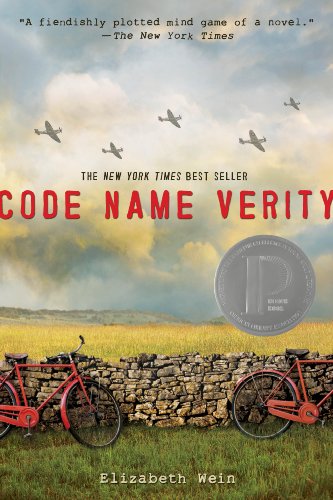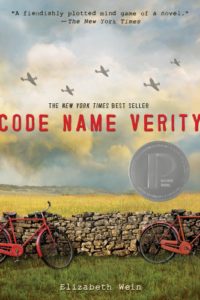Book Review: Code Name Verity by Elizabeth Wein
In a Gestapo cell somewhere in Vichy France, a captured spy has been broken. She writes a story telling of her secret mission, but in order to do that, she must first tell of the friendship between ATA pilot Maddie and SOE wireless operator Queenie. The years flow back to a fateful motorcycle ride….
According to the author’s notes, this started out as a fictionalized account of one of the young women who joined Britain’s Air Transport Auxiliary, pilots who shuttled aircraft and people around the British Isles (and later Europe) during World War Two to free the RAF for fighting. But then she found a way to tie that into a young woman working for Britain’s wartime espionage agency, the Special Operations Executive.
Queenie’s from a noble Scots family (they even own a castle!) while Maddie’s a working class Jewish girl whose grandfather is an immigrant. Ordinarily, they would never have even met. But as war encroaches, Maddie gets a chance to prove she can fly a plane very well indeed, and Queenie gets to put her time at a Swiss boarding school learning French and German to good use. During an air raid, they wind up in the same bomb shelter, a conversation is struck up, and the two become good friends.
We know from the beginning where this story is going to end up, and it seems like the spy is just stalling for time (after all, D-Day isn’t that far away) until halfway through the book, the perspective shifts ninety degrees. Not everything the spy has said is the absolute truth, and events are not entirely what they seem.
While it’s highly implausible that the Gestapo would let a captured spy write out an entire novella about her past (it’s implied the officer in charge wants a change of pace, he certainly recognizes literary devices like foreshadowing when he sees them), it’s an effective storytelling device. And there’s enough clues in the first half that when the twists happen in the second part, the reader can recognize what’s going on.
This is marketed as a “young adult” book, and won a Printz Award, but is for the older part of that age range given the subject matter and some strong language. Suicide, rape and torture are discussed and the latter has happened to the captured spy. Maddie is sexually harassed and subjected to antisemitism. Concentration camps are mentioned, but not in their full horror.
There’s an afterword where the author explains what she changed to make the story possible, and a bibliography for further reading on the real events of the ATA and SOE. In the edition I read, there’s also a chapter of the sequel, which has a different central character.
I will admit to feeling towards the latter part of the first half that the story was rapidly becoming pointless, but the perspective change redeemed that.
Recommended to senior high school students and up looking for suspenseful stories of young women serving in World War Two.


